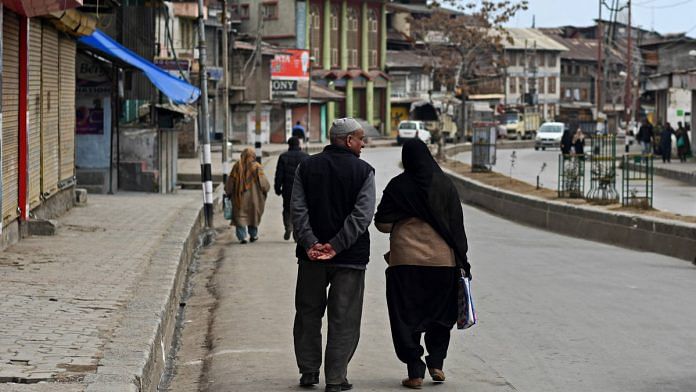New Delhi: The decision of the Narendra Modi government to scrap Article 370 and convert Jammu and Kashmir into a union territory was a huge surprise to everyone outside a small circle within the government.
But the decision was not only a top secret but also so meticulously planned that it included unprecedented financial manoeuvres to allow the new union territory of Jammu and Kashmir to become the first and only one to get a share of central taxes awarded by the Fifteenth Finance Commission.
The recommendations of the panel are due to come into effect from 1 April 2020.
According to the provisions in the Jammu and Kashmir Reorganisation Bill that was passed by Parliament Tuesday, J&K will be treated as a state rather than a UT for all practical purposes by the finance commission.
“The President shall make a reference to the Fifteenth Finance Commission to include Union Territory of Jammu and Kashmir in its terms of reference, and make award for the successor Union Territory of Jammu and Kashmir,” states the bill, which will become an act after the President’s nod.
Economists said the move will provide J&K access to higher funds and more certainty about finances, while making it easier to transition back to statehood, as promised by the government.
Asked about the plan, N.K. Singh, chairman of the Fifteenth Finance Commission, told ThePrint: “Till we receive the formal reference from the President, no action can be taken at our end. The President will have to issue a revised notification and one will have to see what the notification says before I can comment.”
Also read: Data doesn’t support Amit Shah’s claim that Article 370 deprived J&K of development
Changing track
A finance commission decides what percentage of the total share of central taxes will go the states. The Fourteenth Finance Commission had awarded 42 per cent of the divisible pool of taxes to the states. Of this, Jammu and Kashmir got 1.854 per cent of the share of taxes.
So far, successive finance commissions have taken the view that the devolution of central taxes is only for state governments and not Union Territories, irrespective of whether they have state legislatures or not.
Instead, UTs get grants from the central government, or the Union Home Ministry to be specific. This means that even Delhi and Puducherry, the two UTs with their own legislatures, only get grants and not any awards from the finance commission.
The change made for Jammu and Kashmir has not been extended to Ladakh, which has been split from it. Ladakh will be treated as a Union Territory and receive grants from the central government, according to the bill.
“…The central government may, having regard to the resources available to the successor Union Territory of Ladakh, make appropriate grants and also ensure that adequate benefits and incentives in the form of special development package are given to the backward areas of this region,” the bill states.
Greater financial security for J&K
D.K. Srivastava, chief policy advisor at consulting firm EY and member of the Twelfth Finance Commission, said: “The wording of the bill indicates that the Union Territory of J&K will be treated differently. J&K stands to benefit if it is treated as a state and awarded funds by the finance commission.”
However, Srivastava said this would increase clamour from Delhi and Puducherry for similar treatment.
Meanwhile, N.R. Bhanumurthy, professor at the National Institute of Public Finance and Policy, said J&K would have greater certainty around finances because of this plan.
“The devolution of the divisible pool by the finance commission is constitutionally authorised. To that extent, it provides greater certainty around finances,” he said.
“Once the report is final, the state is ensured of its share of funds. The finance commission also has greater resources at its disposal, thereby ensuring that the states get more funds as compared to Union Territories,” he added, pointing out that there is a separate finance commission for UTs but its assessment is not as “deep” as the Fifteenth Finance Commission.
Bhanumurthy also said the plan will make the “eventual transition of Jammu and Kashmir from a Union Territory back to a state — as announced by the government — smoother”.
Also read: Ridiculous, foolish, atrocious – How Modi govt fans are slamming it on economic policies




What this underlines is that by no sensible criterion can J & K be regarded as a UT. Delhi is an exception, for different reasons, since it is the federal capital. Otherwise, union territories are small slivers of land which due to various historical reasons are neither here nor there. Their population is too small for the majesty of statehood to be conferred upon them. 2. The National Conference has today challenged the abrogation of Article 370 in the Supreme Court, so there will soon be legal clarity on this. However, the conversion of this bejewelled state into a UT is something totally incomprehensible.
The only plausible explanation for converting J & K into a UT is that it will help the central government deal more effectively with security challenges. However, for all practical purposes, the security establishment has always enjoyed complete freedom and latitude to do what it considers necessary. The promise of a transition back to eventual statehood may not find many takers in the Valley at the moment.